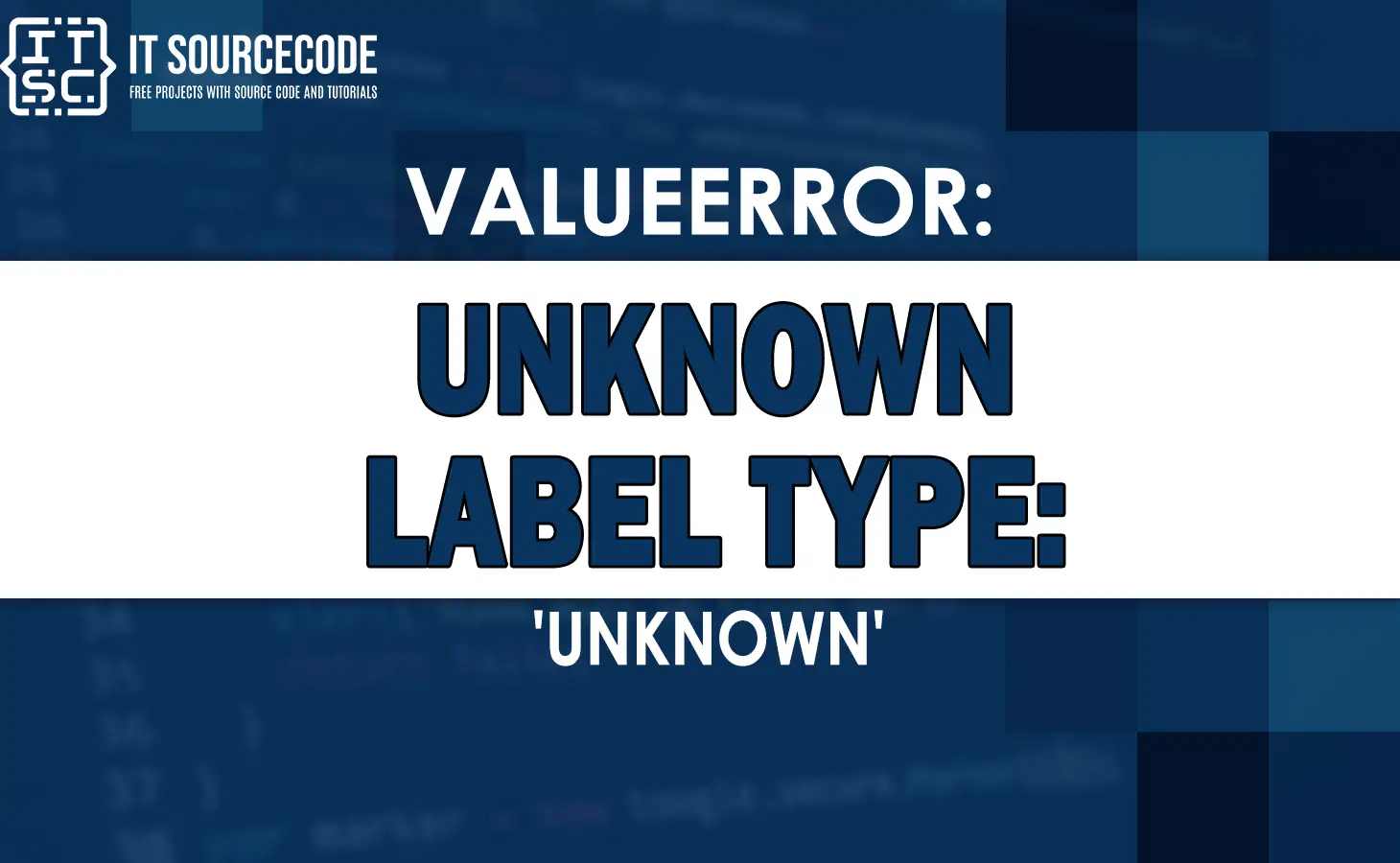In programming, encountering errors is a common existence. These errors sometimes can be incomprehensible and challenging to understand, especially for beginners.
One of the error that developers often come across is the ValueError: unknown label type: ‘unknown’.
This error message can be interrupting, as it prevents the successful execution of the code.
Causes of the ValueError unknown label type: ‘unknown’
This explicit error message ValueError unknown label type: ‘unknown’ typically occurs when we are working on machine learning or data classification tasks. It mostly shows an issue related to the labels or target values used in the code.
Here are some common causes for this valueerror:
- Incorrect or unrecognized labels
- Data type incompatibility
- Missing label encoding
- Label mismatch
How the Error Occur?
The “ValueError: unknown label type: ‘unknown’” error usually occurs if there is a mismatch between the input labels and the expected label format in a machine learning model.
Here’s an example code that can trigger this error:
from sklearn import svm
from sklearn.datasets import make_classification
# Generate a sample dataset
Variable1, Variable2 = make_classification(n_samples=100, n_features=2, n_informative=2, n_redundant=0, random_state=42)
# Create an SVM classifier
classifier = svm.SVC()
# Train the classifier
classifier.fit(Variable1, Variable2)
# Try to predict with an unknown label type
unknown_label = 'unknown'
classifier.predict(unknown_label)The code uses scikit-learn to make an SVM classifier and train it on a synthetic dataset.
When attempting to predict using an unknown label type like ‘unknown’, a ValueError occurs because the classifier expects specific label types, such as integers or floats.
Let’s move on to the solutions to resolve this error.
Solutions for the ValueError: unknown label type ‘unknown’
Now that we have seen an example program which is triggering the ValueError: unknown label type ‘unknown’ error, let’s move on to some effective solutions to fix it.
Solution 1: Verify the Data Labels
The first step is to ensure that the data labels used in the code are correct.
You need to check if the labels correspond to the expected values and are spelled correctly.
Also, ensure that the labels are present in the dataset and properly aligned with the corresponding data samples.
You can print the unique labels in your dataset using the following code:
different_labels = set(y)
print(f"Different labels: {different_labels }")Solution 2: Check Data Type Compatibility
It is necessary to check the data type compatibility between the labels and the code’s standard.
Some machine learning algorithms require labels to be of a specific data type, such as integers or strings.
In case the labels’ data type doesn’t match the algorithm’s requirements, a ValueError can occur.
To check the data type of the labels, you can use the following code:
print(f"Data type of labels: {type(y[0])}")When the data type is different from what is expected, the proper measures need to be taken to convert the labels to the desired type.
Solution 3: Encode Categorical Labels
When dealing with categorical labels, it is important to perform label encoding.
Label encoding is the process of converting categorical labels into numerical representations.
Many machine learning algorithms require numerical inputs, and failing to encode categorical labels can lead to the unknown label type error.
The scikit-learn library provides the LabelEncoder class, which reduce the label encoding process.
Here’s an example of how to use it:
from sklearn import svm
from sklearn.datasets import make_classification
from sklearn.preprocessing import LabelEncoder
# Generate a sample dataset
Example1, example2 = make_classification(n_samples=100, n_features=2, n_informative=2, n_redundant=0, random_state=42)
# Create a label encoder object
encoder = LabelEncoder()
# Encode the categorical labels
encoded_labels = encoder.fit_transform(example2)
# Create an SVM classifier
classifier = svm.SVC()
# Fit the classifier to the encoded labels
classifier.fit(Example1, encoded_labels)The code encodes categorical labels using LabelEncoder and trains an SVM classifier on a synthetic dataset for prediction.
Solution 4: Resolve Label Mismatch Issues
If there is a mismatch between the labels provided and the ones expected by the code, it is important to review and resolve this issue.
Label mismatches can occur when labels are sourced from various datasets, preprocessed ilogically, or merged inappropriately.
Solution 5: Check Data Preprocessing Steps
The ValueError can also be caused by incorrect or incomplete data preprocessing.
Data preprocessing steps, such as feature scaling, normalization, or handling missing values, can impact the labels’ integrity.
Check your data preprocessing pipeline to ensure that it is not introduce any errors or difference.
Solution 6: Consult Documentation and Online Resources
If you have tried the above solutions and the ValueError still persists, it is advisable to consult the documentation and online resources that specific to the libraries or frameworks you are using.
Also, Check the documentation of the library or framework that raises the error.
Look for code examples, tutorials, or forum discussions related to the specific error message.
In addition, the open-source community can provide valuable insights and solutions to resolve the challenging issues like this one.
Frequently Asked Questions
The ValueError: unknown label type: ‘unknown’ error typically occurs in machine learning or data classification tasks.
It suggests that there is an issue with the labels or target values used in the code.
The error message shows that the code encountered a label type does not recognize or support.
To identify the cause of the ValueError: unknown label type ‘unknown’ error, you can examine the data labels, their compatibility with the code’s expectations, and the presence of any label encoding requirements.
To find additional resources to resolve the ValueError: unknown label type: ‘unknown’ error, you can refer to the documentation of the libraries or frameworks you are using.
Conclusion
In this article, we have discussed the causes of the ValueError and provided example code to illustrate the error.
We have also shown several solutions to help you resolve the ValueError: unknown label type: ‘unknown’ error effectively.
By following the provided solutions and understanding the causes of the valueeror in this article, you can fix this error with confidence.

